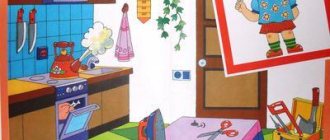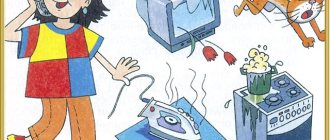Etiquette rules for children are one of the important topics that parents should raise in their family in a timely manner. A person of any age living in a society must take into account the norms of behavior accepted by this society and follow them. The child’s place in society depends on how conscientiously parents raise their child.
What is etiquette?
Etiquette is a set of norms and rules governing the behavior of people in society or a particular social group. When we talk about etiquette for children, we mean the rules of good behavior, first of all, in relation to adults, because they are the ones who can evaluate behavior as “good” or “bad” due to their experience.
Etiquette is divided into different types - there are both generally accepted rules and special etiquette for individual occasions (for example, official, religious, mourning). Children should be taught etiquette gradually, and for preschool age, those rules of good manners that children can apply in everyday situations are sufficient.
When to instill good manners?
You can teach children rules of behavior from a young age, although awareness will come much later - after 5 years. Children should be introduced to table manners from the age of 2. The child is already quite capable of eating on his own, which means it’s time to start explaining how he can and cannot behave while eating.
Preschoolers are taught etiquette by their parents at home and by teachers in kindergarten. The baby is in the company of adults and children; situations arise around him every day that require politeness, respect for elders, and the ability to interact with peers.
When a child grows up and goes to school, his level of freedom will increase, and there will be less control from adults. All omissions of parents in upbringing will be clearly visible, and correcting the behavior of schoolchildren is not easy. That is why the rules of etiquette and ethics (the foundations of ethics and ethics) must be laid down from an early age.
Communication with children
This is the most important point of the rules of conduct for children in kindergarten. If your baby does not behave as expected, you may have serious problems. Many parents react very violently to the slightest offense inflicted on their child. They can seriously spoil not only your mood. So teach your child caution, tolerance and common sense when interacting with children:
- You cannot beat, insult, or touch other children, even if they allow themselves to do so. In response to beatings and curses, you need to complain to your parents and teachers, and no longer communicate with the aggressor. It is better not to approach cruel children at all.
- You cannot boast about your financial situation and humiliate other children with hints about their poverty. The child himself has not yet earned anything, and in this sense all children are equal.
- You can’t spoil other people’s things and allow them to break your own. If other children break a toy, it is important to complain to parents and teachers in order to avoid a conflict.
- You cannot take other people's things for yourself, either secretly or openly. If you really want a toy, you need to ask your mother for it, and not take it from others. You cannot even accept a toy as a gift, as this may cause indignation among parents who bought this item for their child and do not intend to lose it.
- You cannot interrupt, shut up, or discuss other children behind their backs. A polite person will always listen to others and will not impose his opinion if they do not want to listen to him. It is also important not to occupy the airwaves with your person. Many children talk a lot and do not allow a word to get in, and therefore very soon they are left without listeners and worry, not understanding why this happened.
Any conflict situations are resolved by the teacher; he is an arbiter and judge.
Don’t be shy about complaining, because timely intervention will prevent a fight. If a child does something that is forbidden, imitating bad examples, this should also be reported to the teacher. Only he can call the parents and notify them about the problem that has arisen.
Parents themselves must set a good example. There is no need to sort things out with children who have done wrong. This is not your job, you have no right to scold and shame them. You can express your indignation in a calm manner to the teacher and parent if the problem is serious. But there is no need to throw a tantrum, especially in front of children. Fights and other antics will only worsen the situation and force you to look for another kindergarten. But you are neighbors, why should you quarrel?
What should a preschooler know?
The best example for a child is family members, primarily parents. By imitating them, the baby learns good and bad, so parents must control their behavior in front of the child. You should not forcefully teach your child politeness if, due to his age, he still cannot understand why he needs to say hello to strangers. Or with those about whom his parents do not speak very well. In addition, imposing rules can lead to a backlash – protest.
Around age 5, just when adult imitation is in full swing, is the time to start paying your child's attention to how you interact with other people, especially outside the family. Here are the rules that a preschooler needs to know so as not to get into an awkward situation and not make their parents blush.
Speech etiquette
It is necessary to follow the rules of speech etiquette not only with members of your family, but in general with all children and adults, not necessarily only with acquaintances. Adults should set an example for children and also follow the rules of communication:
- greet your family in the morning, wish them good night before going to bed;
- greet acquaintances on the street and at a party, and then say goodbye to them;
- say hello to your neighbors, even if you don’t know each other personally;
- use the words “thank you”, “please”, “be kind”, “sorry”;
- address strangers using “you”;
- do not insult, do not tease other children, do not snitch, do not provoke;
- apologize if you did something wrong;
- say “let me interrupt you” if you need to address one of the speakers.
Table etiquette
A child should be taught table manners from an early age, and as they grow older, the requirements for the child will increase. The way a child behaves at the table creates the main idea of his upbringing, cleanliness and respect for such a family ritual as eating.
During meals, you must observe table etiquette:
- you need to eat only in a designated place (kitchen or dining room);
- use cutlery during family meals, this also applies to small children (prevent smearing food with your fingers on the plate);
- you need to eat from your own plate, do not comment on the contents of someone else’s;
- do not pounce on food if not all family members have gathered;
- do not chat with your mouth full, remember the rule “when I eat, I am deaf and dumb”;
- chew with your mouth closed;
- do not play with food, do not indulge in drinks (do not spill tea, water, do not drink juice loudly through a straw);
- it is indecent to express your negative opinion about food (“ugh, that’s disgusting”, “I won’t eat this”);
- it is indecent to put your elbows on the table, to push;
- It’s not nice to stretch across the entire table; you need to ask the person sitting next to you to pass something;
- You can’t pick your mouth at the table;
- you need to use a napkin or towel, and be able to ask for a clean napkin;
- take from the plate that piece of bread (piece of pie, sandwich, fruit) that is closest, and not choose the one that is larger or more beautiful;
- Moreover, it is indecent to take a piece from a common plate, hold it and put it back;
- before leaving the table, you need to wait until all family members have finished the meal, or ask adults for permission to leave;
- You can’t take a plate of food and go to the TV or to another room.
Guest etiquette
When visiting, you need to behave calmly, show respect to the owners of the house and follow the rules:
- do not come empty-handed (bring some kind of treat, even symbolic);
- do not ask for tea without an invitation;
- always say hello to the owners of the house;
- you cannot walk around rooms without permission and touch other people’s things on shelves or inside cabinets;
- It is strictly forbidden to jump on beds, sofas, chairs, even if the owner’s child does this;
- do not throw tantrums, do not demand anything from the owners of the apartment;
- keep clean, throw away trash after yourself (candy wrappers, juice boxes), collect toys after yourself;
- calmly pack up and leave when the time comes, do not demand to play more;
- Be sure to say “thank you” for the hospitality and food, and say goodbye to the owners of the house.
Family etiquette
The rules of behavior in each family are established individually, but there are common ones for all - respect and mutual understanding.
When communicating with family members, you must adhere to the following rules:
- older relatives must be treated with respect, without being rude, not insolent, or undermining the authority of the head of the family;
- You cannot swear or shout at family members;
- if you need to get into the room of your parents (or other relatives), you should definitely knock;
- it is at least ugly to tell or “report” on a brother or sister;
- It is important to respect the work of family members, be it cooking, cleaning the house or playing together.
Rules of behavior on the street
If at home only family members can judge a child’s upbringing, then on the street all the flaws in upbringing are striking. So that you don’t have to blush awkwardly and embarrassly take your baby away, teach him the following rules:
- there is a trash can for garbage;
- It is forbidden to walk on lawns or pick flowers from flower beds;
- it is indecent to point a finger at people and discuss their appearance out loud;
- you cannot cross the road whenever and wherever you want if cars are driving along it;
- You should not intrusively tell any personal information to strangers;
- it is forbidden to leave the place where the parent left the child waiting for him, or where they agreed to meet;
- When walking, you should not run far ahead of your parents or hide in busy places;
- when moving along the sidewalk, you need to walk on the right side (analogy with lanes for cars);
- Don’t stop in the middle of the sidewalk to tie a shoelace or chat with a friend—you need to step aside.
Behavior in transport
Sooner or later, you and your child will have to go somewhere by public transport, so instruct your little passenger in advance on how to behave on a bus, train, train, or plane:
- on the bus, give up your seat to older people (if the child is still small, then explain that now he needs to sit for his own safety, and another person will give up his seat to the grandmother);
- offer a place to pregnant women (when the child already knows this concept);
- on a long-distance train you cannot run around the carriage or knock on other people’s compartments;
- do not shout, do not knock on the wall of the train compartment;
- on an airplane you cannot stand up from your seat if this is temporarily prohibited, shout loudly, or push the seat in front with your feet;
- in any type of transport, it is indecent to dirty the person sitting in front with your feet or push the back of the chair with dirty shoes;
- It is forbidden to shout, laugh loudly, or sing songs.
Rules of conduct at the theater, circus or other cultural event
Parents have the opportunity to introduce children to cultural life from an early age - theaters, museums and other institutions are now available almost from birth. Therefore, before visiting such places, you need to explain to your child how to behave:
- do not be late for the performance, but arrive with plenty of time to return your outerwear and visit the restroom, if necessary;
- come to the hall before the program starts in order to take your seat and not disturb your neighbors;
- if you are still late, you need to move forward to your seat along the row facing forward, and apologize for the inconvenience caused;
- do not crunch on food or make noise with your drink during a performance or movie show;
- do not talk during the session, do not answer phone calls, put the device on silent mode.
General rules of conduct
There are things that are unacceptable in any place, in any team:
- scratching, picking teeth, ears, nose in public;
- get ahead of others when passing through a door, for example, in a store;
- scream, run, slam doors;
- be rude, answer questions unkindly;
- cough without covering your mouth and burp without apologizing;
- shouting on public transport;
- run and step on feet;
- shuffle your feet when walking;
- chew gum without covering your mouth, chew loudly in public.
Behavior on site
Going outside for preschoolers is fraught with many dangers. Outside the kindergarten, a child can get seriously injured or even get lost if he does not know the rules of behavior in kindergarten and during walks. Teach the tomboy to obey his elders and follow all the recommendations of common sense, which the little one has not yet developed.
- You need to go out onto the playground or into the street in pairs and formations, as the teacher said. On the way back, you need to make sure that your date is in place and that everything is okay with her.
- You cannot leave the playground without the accompaniment or consent of a teacher. Any attempts by strangers to talk to adults, give something, or take them outside the fence must be stopped. You need to immediately run to the teacher and tell him everything. Under no circumstances should you take candy and toys, talk, or leave with strangers.
- It is forbidden to run in front of swings and carousels, they can injure the child.
- Before starting a group game, you need to listen to the rules of conduct and follow them.
- You can’t run or jump too actively, otherwise you might hurt others.
Parents must also follow the rules of the game: do not pick up the child until you have agreed with the teacher.
And if you are delayed or have changed the choice of escort to your home, please inform us in advance. Even if a conflict situation arises in kindergarten, do not lose your temper in front of the children and do not force your son or daughter to blush for you. It is important to explain everything calmly. And, of course, only for adults. Do not contact other children, and certainly do not scold them.
Cultured people always come from cultured families. Whatever the kindergarten, it is the parents who are the main authorities for the child, they are the ones who bear the main responsibility for his upbringing. Don't set a bad example, and your baby will learn only good things.
Rules of conduct for preschoolers in pictures
You can teach your child etiquette both by example and by visual aids. You can explain how to behave in society and show illustrations. The book “Etiquette for Kids” in pictures by E. V. Sokolova and N. N. Yankovskaya is suitable for this.
When showing your child a picture, you can ask leading questions: “What do you think is shown here? How should you behave?" Let the child try to formulate the rules of behavior himself.
Summarizing
At first glance, it may seem that there are too many rules of behavior for children. But, on the other hand, you and I know them, which means our children will be able to master them. And only you, parents, can help them with this. And mainly by his clear example!
If basic rules of behavior are not instilled in a child on time, then in society he will experience discomfort, rejection, and ultimately withdraw into himself. Then more serious problems will have to be solved. I'm sure you don't need such problems.
Elena Sh.
Learning by playing
You can also teach your child the rules of good manners through play. Conduct politeness lessons at home when you are studying with him or just playing in the nursery. You can play out situations with the help of dolls and your favorite toys - write a fairy tale about someone ill-mannered, act out a mini-scene, come up with etiquette games (“tea party with dolls”, “the bear went to visit”, etc.), and then - discuss and ask: “Who did the right thing? And why? Who will mom praise?" You can put on a whole theatrical performance for kids.
Read books on this topic and discuss which characters behave correctly and which ones are rude to others. There are many books on the topic of children's etiquette, here are some of them:
- “Etiquette for children of different ages”, A. Usachev;
- “Rules of Conduct”, E. Beaumont;
- “Polite words”, O. Korneeva;
- “Sociable Tales”, T. Shorygina;
- “The ABC of Politeness”, L. Vasilyeva-Gangnus;
- “School of politeness for small owners”, N. Ivanova, G. Shalaeva;
- “Rules of conduct for well-mannered children”, G. Shalaeva, O. Zhuravleva, O. Sazonova;
- “The most important rules of behavior for well-mannered children”, Harvest publishing house;
- “Etiquette for Fidgets”, Clever publishing house;
- “How to behave at the table. Etiquette for everyone in stories, poems, pictures,” ed. R. Dankova.
In preschool educational institutions, children are taught politeness according to specially developed programs. Teachers organize classes and teach children the rules of good manners, but this does not mean that parents should abandon this topic and rely only on teachers.
Why do we need table rules?
Compliance with rules and etiquette at the table is not the prerogative of a certain social group of people. It has nothing to do with the level of income or social status of the family. “We are from simple people, from workers. Why do we need all these tablecloths, napkins, forks and knives? Why does my child need all this? “Kindergarten teachers sometimes hear something similar. It is important to understand that the culture of nutrition and behavior is not whims, not the desire to “show off” in front of others. The fact is that following certain rules of etiquette at the table makes sense and has specific benefits for children. Let's look at some of them:
- Washing your hands before eating protects the body from pathogenic bacteria entering with food;
- Setting the table using a clean tablecloth and disposable napkins protects food from coming into contact with the surface of the dining table;
- The requirement to “not fidget” and not talk while eating is to prevent serious incidents at the table (the child may choke);
- The request to “take your time,” sit up straight and chew your food thoroughly is nothing more than helping the stomach digest what you eat quickly and easily;
- A napkin placed on your knee (or chest) will protect your clothes from getting dirty.
Rules of conduct in the theater for children
I would especially like to highlight the use of special cutlery during meals. Many still believe that this is nothing more than deliberate behavior of the upper class, in order to show their skills and knowledge in this area. It's not like that at all. To use devices skillfully, you do not need to be a representative of a certain group. The use of devices is not intended to exhaust, but to facilitate the actions of the eater . It is much more convenient to eat meat by cutting it into pieces (rather than biting whole with a fork), it is convenient to cut fish with a special fork, and eat dessert with a small spoon or fork. It's true?
Note to parents
It is difficult to name the exact age when you need to start teaching your child good manners. It is necessary to instill in a child norms of behavior with family members and society from birth, even when the child does not understand the whole essence. He understands the intonations, the mood of his family and sees the picture of what is happening.
The table below clearly illustrates the approximate age range when you can introduce your child to the rules of behavior.
Table “When and how to teach a child etiquette”
| Age | What to pay attention to |
| Up to 1 year | We use polite words in our speech (“thank you”, “please”, “good morning”, “good night”) |
| We wash our hands before eating, saying out loud why we need to do this | |
| 1-3 years | We instill neatness - use a bib or napkin, change soiled clothes after eating, wash your face and hands |
| We instill norms of behavior and communication in the family, showing by example respect and politeness | |
| We teach to eat with a spoon and fork, we replace the sippy cup with a mug | |
| 3-5 years | We improve the skill of using cutlery, teach how to eat carefully - do not move away from the table, lean towards the plate so as not to spill the soup, and not to spread “dirt” around you |
| We actively teach independent personal hygiene - brushing teeth, washing hands, using a handkerchief or napkin. | |
| We teach you to cover your mouth when coughing or sneezing; don’t forget about polite wishes addressed to another person (“Be healthy”) | |
| We introduce the child to the rules of behavior in public places, transport, at a party, at cultural events, in kindergarten | |
| 5-6 years | We continue to introduce the child to table etiquette, adding the use of a knife to everyday life |
| We improve our knowledge of guest etiquette, apply the rules if we go on a visit; we correct mistakes, explain to the child why some actions are unacceptable | |
| By our example we constantly show how to communicate in the family and in society outside it, we monitor our behavior | |
| School age | Let’s not forget everything we instilled in the child before; we remind you how to behave at the table (in the school canteen), in lessons (speech etiquette, respect for the teacher, peers), in transport (independent trips) and public places |
Etiquette in the toilet and bedroom
The most sensitive topics tend to raise the most questions and misunderstandings from kids. This is rarely discussed with them, and they have nowhere to get information from. Therefore, discuss with your child the rules of behavior in kindergarten that govern his trips to the toilet.
- Crowding around sinks and toilets is prohibited. If more than 6 children have already entered the room, you need to wait. If it’s completely unbearable to stand, you need to ask the teacher what to do? It will help you find a way out faster.
- You should always use toilet paper and flush after yourself. If there are any drops left on the seat, they should be wiped off and your hands should be washed immediately afterwards.
- After visiting the toilet, you should wash your hands with soap and dry them. This is a must, otherwise it’s easy to get sick.
- It is prohibited to splash water, climb onto radiators, or throw various objects into the toilet. You cannot draw on the walls or floor, even if you really want to.
- You cannot lock yourself in the toilet to play or deceive the teacher.
It is also important to remind your baby how to go to bed correctly. This ritual has its own recommendations.
- Before quiet time, children brush their teeth and go to the toilet for their needs.
- You cannot be capricious and argue with the teacher about the fact that you don’t want to sleep or are too lazy to brush your teeth. You need to listen to nannies and children's teachers.
- You cannot play or throw pillows in the bedroom. These activities disturb everyone and disrupt their routine.
- If you need to leave, it is important to do it slowly, carefully, calmly, so as not to wake up other children.
- Clothes must be folded in perfect order on the chair.
A daily sleep schedule is very important for children, because if it is not there, their evening activity will drive the parent crazy. Sleeping during the day calms the child and normalizes the state of his nervous system. So you need to teach your baby not to interfere with others, if he really does not want to end up in bed. We would like his problems!






